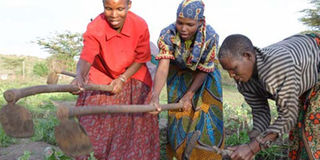Let us invest in rural women to end hunger

What you need to know:
- We obviously have more women leaders today than there were two decades ago and more girls go to school, but there is still a long way to go before women and girls can be said to enjoy their fundamental rights.
Gender equality and the empowerment of women are gaining ground all over the world, but there is still an urgent need to support rural women as part of wider efforts to end hunger and poverty.
We obviously have more women leaders today than there were two decades ago and more girls go to school, but there is still a long way to go before women and girls can be said to enjoy their fundamental rights.
Women and girls in rural areas make up one-quarter of the global population and yet they are at the bottom of every economic, social and political indicator—from income and education to health and to participation in decision-making.
Despite rural women being a major part of the agricultural labour force performing most of the unpaid care work in rural areas, they continue to be held back in fulfilling their potential.
Investing in rural women is important in a nation’s development. Given the chance and equal access to productive resources, women can help wipe out hunger from the face of the world.
Discriminatory laws and practices affect not just women but entire communities and nations. Countries where women lack land ownership rights or access to credit have more malnourished children.
It is strange that even in those countries with the best records there is under-representation of women in political and business decision-making.
Training girls and women in rural areas is another requirement for empowering them. They need to be given vocational education in agriculture. There is a good reason for this. The energy, talent and strength of women and girls represent humankind’s most valuable untapped natural resource.
Giving women soft loans, teaching them scientific ways of farming and preserving food products and creating a market where they can sell their products without the intervention of middlemen can improve the living standards of rural women.
Let’s protect our children
Cases of abductions and killing of children are on the rise, prompting fear among families. Last month, four children were kidnapped in Arusha, and two were murdered after their parents failed to pay ransom.
In Morogoro, a five-year-old girl was abducted last Tuesday. The motive was unclear, but the girl’s body was found in a latrine pit two days later.
Children are our nation’s most precious resource, and these developments are cause for grave concern. Economic hardships may be forcing the youth to commit such crimes to get money quickly. However, this is an unacceptable way of making money.
Abductions are common in some countries, but the child predators are always on the losing side. They either die or end up in jail.
There are many economic activities that the youth can do to earn money rather than kidnapping children and demanding ransom.
Inspector General of Police Simon Sirro has cautioned parents to be more vigilant following a spate abductions and killings.
Times have changed, so parents and teachers should under no circumstances take the safety of their children for granted.
Every home and school should start teaching children about safety and protection measures. Moreover, they should work closely with law enforcers whenever they pinpoint suspects.




